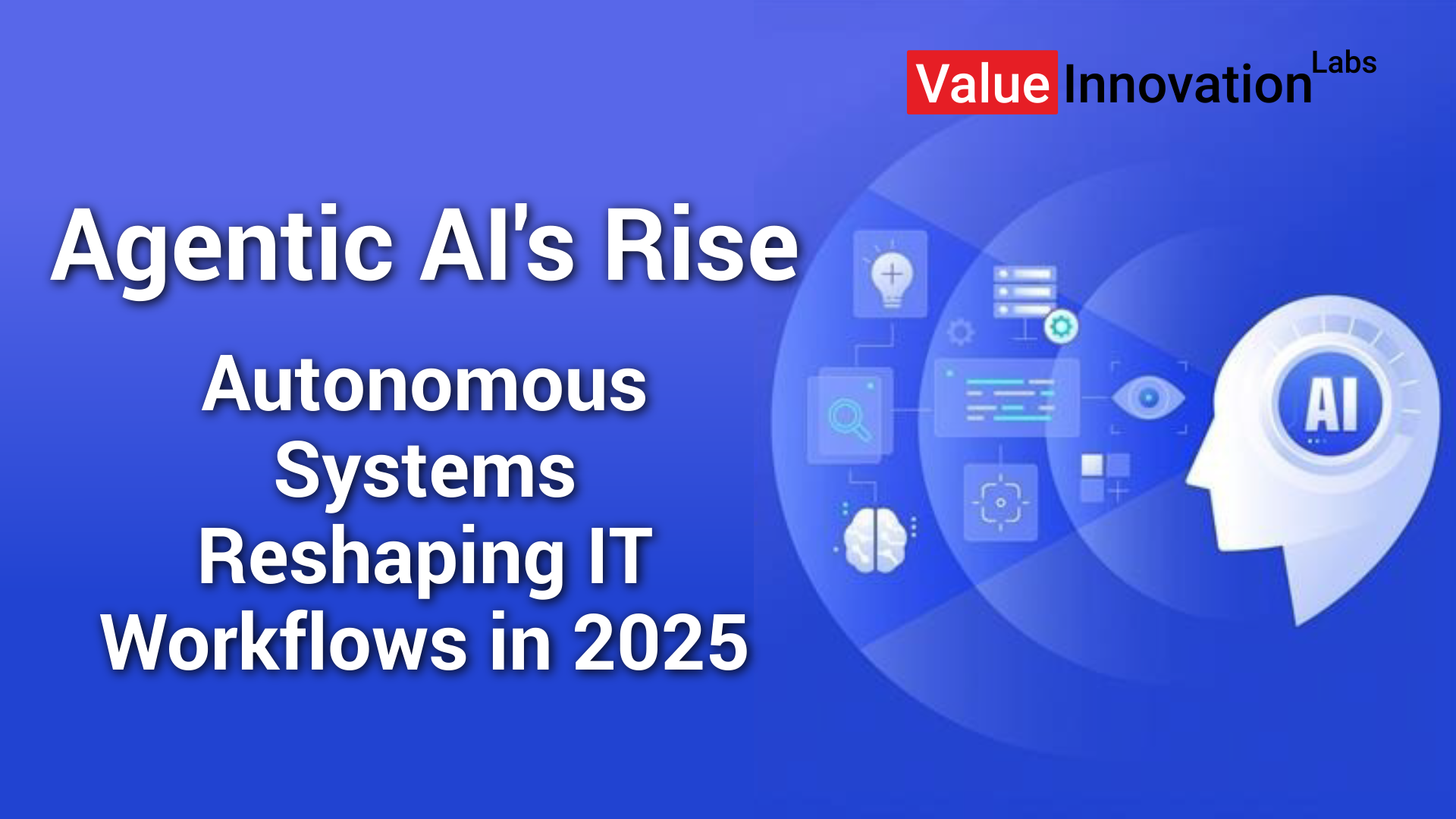
Agentic AI’s Rise: Autonomous Systems Reshaping IT Workflows in 2025
- by Indu Sharma
The landscape of information technology is rapidly evolving, and 2025 is set to be a defining year for AI Agentic systems. Autonomous systems — also known as autonomous agents — are no longer a futuristic concept. They are becoming integral to IT operations, software development, and digital transformation initiatives across industries. For organizations striving to stay competitive, understanding and leveraging agentic AI has become essential. visit for more: value innovation lab
What is AI Agentic?
AI Agentic refers to artificial intelligence systems capable of acting independently, making decisions, and performing tasks without constant human intervention. Unlike traditional AI tools that rely on human input for every step, agentic AI can observe, plan, and execute workflows autonomously, adapting to dynamic environments in real time.
These systems operate through autonomous agents, software entities designed to accomplish specific objectives. Each agent can gather data, analyze it, make decisions, and execute actions while interacting with other agents or human supervisors as necessary.
Why Agentic AI is Transforming IT Workflows
Enhanced Efficiency: Traditional IT workflows often involve repetitive tasks, manual monitoring, and constant human oversight. Agentic AI systems automate routine processes such as system monitoring, incident detection, and performance optimization, freeing IT teams to focus on strategic tasks.
Improved Decision-Making: Autonomous agents analyze large volumes of data in real time, providing actionable insights faster than human teams. By detecting anomalies, predicting system failures, or recommending optimizations, AI agentic tools enhance decision-making across IT operations.
Scalability: As businesses scale, managing IT infrastructure becomes increasingly complex. Agentic AI systems adapt seamlessly to changing workloads, enabling organizations to scale without proportionally increasing human resources.
24/7 Operations: Autonomous agents can operate around the clock, monitoring systems, responding to alerts, and executing critical tasks without fatigue or downtime — a capability that traditional teams cannot match.
Real-World Applications of Autonomous Agents
The adoption of autonomous agents is growing rapidly across IT functions. Some notable applications include:
Network Management: Agentic AI monitors network traffic, identifies potential threats, and autonomously applies mitigation strategies. This reduces response times and minimizes downtime.
Cloud Operations: Autonomous agents handle workload balancing, resource allocation, and performance optimization in cloud environments, ensuring high availability and cost efficiency.
Cybersecurity: AI agentic systems detect security breaches, isolate affected components, and even implement containment measures automatically, enhancing organizational resilience.
Software Development: From automated testing to continuous integration and deployment, autonomous agents streamline DevOps workflows, reducing errors and accelerating release cycles.
Benefits for IT Teams
While some fear that autonomous systems might replace human roles, the reality is different. AI agentic systems are designed to augment human capabilities, not replace them.
Reduces Human Error: Automation of routine tasks ensures consistency and minimizes mistakes.
Frees Human Talent: IT professionals can focus on strategic, creative, and high-value initiatives rather than repetitive maintenance work.
Accelerates Innovation: By handling operational complexity, agentic AI enables teams to experiment, innovate, and deploy solutions faster.
Implementing AI Agentic in 2025
Organizations looking to integrate autonomous agents into IT workflows must approach adoption thoughtfully. Key considerations include:
Define Objectives: Identify which tasks and processes can benefit most from autonomy.
Select the Right Tools: Evaluate AI agentic platforms based on scalability, interoperability, and security features.
Integrate with Existing Workflows: Ensure autonomous systems complement existing IT operations rather than creating silos.
Establish Monitoring & Governance: While agents operate independently, oversight is crucial to maintain control, compliance, and accountability.
Train Teams: Upskill IT teams to collaborate effectively with autonomous systems, focusing on interpretation, oversight, and strategy.
Challenges to Consider
Despite the advantages, AI agentic systems are not without challenges:
Complexity of Integration: Introducing autonomous agents into legacy IT systems may require significant planning and customization.
Security Risks: Autonomous systems can potentially be exploited if not properly secured.
Accountability and Ethics: Clear guidelines are necessary to ensure decisions made by autonomous agents align with organizational and ethical standards.
The Future of Autonomous IT Workflows
By 2025, AI agentic systems are expected to become the backbone of IT operations in many organizations. Autonomous agents will not only handle routine tasks but will increasingly participate in decision-making, strategy planning, and predictive analytics. Businesses that adopt these systems early will enjoy faster innovation, operational efficiency, and a competitive edge in the digital economy.
The synergy between human expertise and autonomous intelligence will define the next generation of IT workflows — where human creativity and strategic thinking are amplified by autonomous execution and data-driven insights.
FAQs
Q1: What is the difference between traditional AI and AI agentic?
Traditional AI typically requires human input for every action, while AI agentic operates independently, using autonomous agents to make decisions, execute tasks, and adapt to changing conditions.
Q2: Will autonomous agents replace IT professionals?
No. AI agentic systems augment human capabilities, allowing IT professionals to focus on strategic, creative, and high-value tasks while the agents handle routine operations.
Q3: What industries can benefit most from AI agentic?
While IT operations are the most immediate beneficiary, sectors like finance, healthcare, logistics, manufacturing, and cybersecurity can leverage autonomous agents to improve efficiency, reduce errors, and scale operations effectively.
visit for more: value innovation lab
The landscape of information technology is rapidly evolving, and 2025 is set to be a defining year for AI Agentic systems.…
